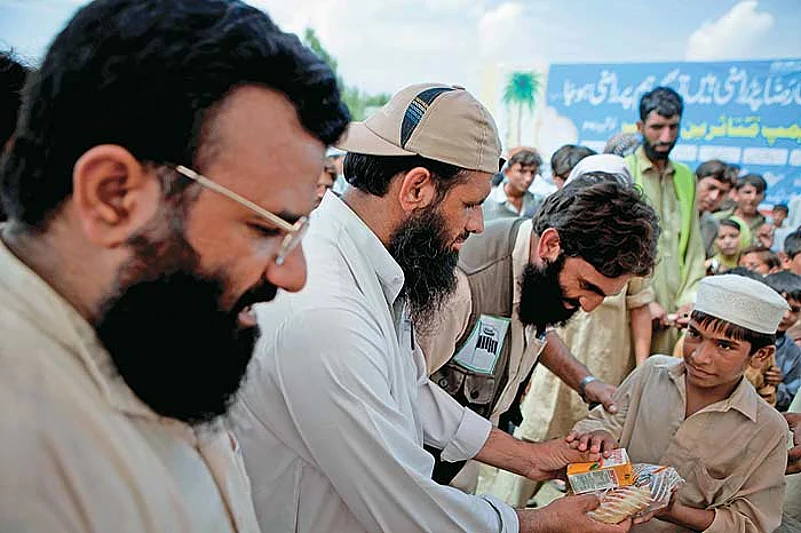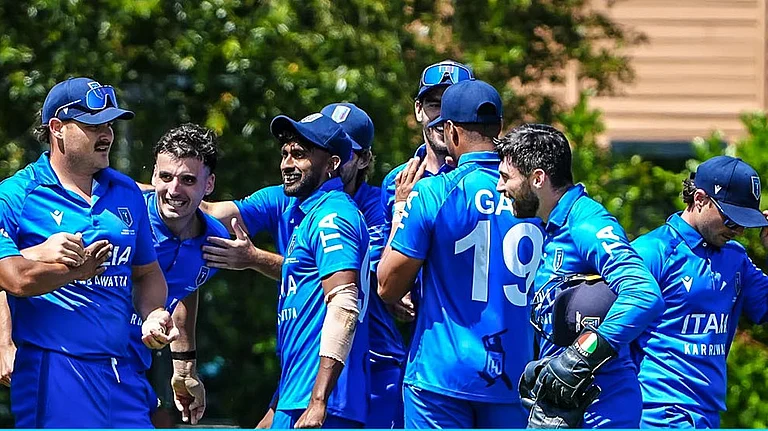When the mighty Indus swelled and spilled over its banks, gradually inundating nearly 20 per cent of Pakistan, teeming millions from decrepit towns and remote hamlets scampered away to safety. There were some, though, who were seen trekking in the opposite direction, wading into the watery graves to rescue those marooned. These civilians, often sporting lush, unkempt beards and dressed in pathan suits, were activists of militant organisations who had spontaneously come to the assistance of beleaguered people reeling under a crisis unprecedented in Pakistan’s history. Nor did their initial enthusiasm ebb in subsequent days—they remain in the forefront of non-government endeavour to provide hot meals, clothes and medicine to the affected, collecting funds to finance relief operations likely to last for months.
They have been hailed in some quarters as saviours who rushed to assist the hapless at a time when government officials had scurried away. Yet, this samaritan act has stoked fears, here as well abroad, about the agenda underlying the flood relief work. Wouldn’t they exploit popular sympathy to widen their recruitment base? Even President Asif Ali Zardari said recently, “We are giving them (victims) everything we’ve got. But there is a possibility that some negative forces will exploit this situation. For example, extremist militants can take orphaned babies and put them in their terrorist training camps.” In its August 17 editorial, the New York Times wrote, “In some areas, radical Islamic charities have provided shelter and hot meals well before the beleaguered Pakistani authorities could bring in food supplies. This is a battle for hearts and minds. It is one that Pakistan’s government, and the United States, must not lose.”
Zardari and America’s worry arises from the sheer number of militant groups operating in the flood-hit areas. Most of these groups were banned, but they have now emerged under new names in those areas facing the wrath of the Indus most. From Jamaat-ud-Daawa (JuD) to Jaish-e-Mohammed to Harkatul Mujahideen to Sipah-e-Sahaba Pakistan to Lashkar-e-Jhangvi to Harkatul Jehadul Islami, they have organised relief camps in flood-affected parts of Punjab, Sindh, Khyber Pakhtoonkhwa and Balochistan provinces. In addition, they are said to have collected millions of rupees for relief operations.
The goodwill these militant groups have generated locally through this philanthropic turn is likely to make it impossible for Islamabad to curtail the activities of Hafiz Saeed, whose JuD, the parent body of Lashkar-e-Toiba, has harnessed its experience gained from years of charity work to organise relief operations. Its efforts during the devastating quake of 2005 had helped it acquire a humanitarian halo—and relief work for the thousands who fled the Swat Valley during the army’s operation against the Taliban last year did its image no harm. In his recent Friday sermon, Saeed urged philanthropists to support the JuD, “The nation needs to stand up and help the flood victims through donations and relief work, as has been the case in the past.”
The JuD has been cautious in providing assistance—now under the adopted name of Tanzeem-e-Falah-e-Insaniyat (Human Welfare Organisation)—but its volunteers haven’t tried too hard to conceal their links to the parent organisation. They wear the badges of both organisations as they bustle around in camps. JuD spokesperson Yahya Mujahid says over 2,200 members of the group are working day and night in the flood relief efforts in the northwest region and south Punjab. As Mujahid told Outlook, “Hundreds more have been dispatched to the flood-stricken areas of Sindh and Balochistan along with dozens of trucks carrying medicines, camps, clothes, ration and clean water.” As for the badges worn by volunteers, Mujahid says the JuD and the Tanzeem-e-Falah-e-Insaniyat are two separate entities working in unison. But this explanation doesn’t have too many takers.
Ataur Rehman, who heads the JuD’s relief operations in Punjab, denies that the group has any ulterior motive in assisting the flood-ravaged people. As he puts it, “To work for humanity is the true spirit of Islam, we don’t expect any reward. Had the government been sincere towards the poor, it would have been the first to reach to the affected. When the floods came, it was we who carried people on our shoulders to the boats and ambulances.”

Photograph by AFP (From Outlook, September 06, 2010)
Analyst Dr Hasan Askari Rizvi says the JuD has adopted a model that the Hezbollah perfected in Lebanon, combining militancy with charity work. “The JuD too is doing this to create goodwill and gain sympathy for its fighters active in India’s Kashmir. There is currently no law to stop volunteers from doing humanitarian work.”
There are others, though, who feel the international media has been needlessly alarmist about the involvement of militant groups in relief work. Among them is former foreign secretary Najmuddin Sheikh, who feels there’s little evidence to suggest that the assistance provided by militant groups constitutes a substantial proportion of the overall flood relief work. The bulk of the relief and rehabilitation efforts, even though falling short of the country’s requirements, can be ascribed to the state and international aid agencies. It consequently follows, he says, that the benefits accruing to the jehadists too would be limited.
But this won’t deter the jehadists from exploiting the natural calamity to their ideological advantage. As Najmuddin says, “The jehadis can make the case that had they been in charge of things, they would have done much better than the present government. They will also argue that this is God’s wrath upon a nation that has chosen an inept government. But the fact is that the magnitude of the devastation is simply unprecedented in Pakistan’s history.”
International outcry prompted the government to announce that it would disallow banned groups to work in flood-affected areas. But Mujahid says no action has yet been taken nor is likely to be taken considering the difficult times the country is passing through. As he argues, “Poor people just want help, that’s it. The people in the flood-stricken areas, living in misery, can hardly have second thoughts about taking help from us. Anyway, the government hasn’t banned us.” The group, indeed, is only on Pakistan’s terror watch list even though the United Nations has banned it.
Interior ministry sources in Islamabad, however, say that directives were issued to all the four provincial governments to prevent jehadi outfits from organising relief activities. They particularly bemoan the reluctance of the Pakistan Muslim League (N) government of Punjab to counter the jehadi groups. One source says Islamabad has already conveyed its displeasure to the Punjab government over its failure to circumscribe Hafiz Saeed’s activities.
The role of militant organisations in the flood relief operations may have been a bit exaggerated, but there still remains the larger question: hasn’t Pakistan learned from the cumulative effect of allowing jehadi outfits free space?





















